Kristin Beck was assigned male at birth, but that identity never felt quite right to her. She secretly wanted to be like her sister, and in elementary school, Beck would try on her clothes when nobody was looking. But she was born in the ‘60s, when there was no public awareness of what being transgender was, so she stuffed those feelings down. Especially when her dad caught her in her sister’s ballet outfit and made it clear that wasn’t acceptable.
That’s not to say that Beck felt completely feminine, either. With a strong history of military service in her family, Beck felt called to serve and became an elite Navy SEAL. She married and had kids, and tried to force herself to fit with the traditional male stereotype, but eventually the marriage fell apart. The feminine part of her never went away, so during short stints between dangerous deployments and secret missions all over the world, Beck would privately express herself as female.
Transgender people weren’t allowed to serve openly in the military, so as Beck grappled with her gender identity, she knew it was one or the other: continue serving or live authentically. She chose to sacrifice her personal identity so she could continue to pursue her higher calling of being a badass warrior.
After 20 years of service and numerous awards, Beck retired from the Navy. With her vast background and technical knowledge, she began working at the Pentagon, but continued to present as male. One day it occurred to her that she was no longer obligated to stay in the closet, so she decided to show up as her true self.
It was not received well. Beck faced quiet hostility and was slowly forced out by alienation, ostracization, and other techniques often used against minority community members. As a highly decorated Navy SEAL, her transition made the headlines. She tried to avoid the media, but eventually agreed to let CNN create a powerful documentary about her, Lady Valor.
Beck began pouring herself into activism. She started doing public speaking about her life and wrote a biography, Warrior Princess. After suffering from PTSD herself, she created a mindfulness-based program and nonprofit foundation to help veterans recover holistically from trauma. In 2016, Beck ran for Congress in Maryland, and while she didn’t win, she helped create change in her state by bringing attention to many neglected programs and infrastructure.
Beck has been an outspoken critic of the Trump administration’s reimplementation of a ban on transgender military service, and she was recently featured in Converse’s Pride campaign. Beck also remarried, and she currently lives and works on a farm in Southern Maryland with her wife.
This is Beck’s story of becoming a Navy SEAL, coming out as trans in an unwelcome environment, finding her voice as an activist, and working to help herself and others heal from wartime trauma.
Profiles in Pride: When did you first start feeling that you were transgender?
Kristin Beck: The first time I remember dressing up and just kind of goofing off and having fun was right around kindergarten, and it was one of my sister’s ballerina outfits. It was this purple leotard kind of thing, and I remember it pretty specifically because my dad caught me wearing it, and it was harsh.
At that point I pretty much ran away from everything, but I always thought about it. We lived in Pennsylvania when I was in elementary school, and during that time I remember always looking at my older sister and totally wishing I was her. I’d see everything she was doing and try to mimic it if I could, but then I’d get in trouble, and then it was bad.
In fifth grade we moved to Memphis, Tennessee. In sixth grade I remember taking some of my sister’s clothes and hiding them up in one of the attics because I finally had my own room. For the first time some of her clothes kind of became mine. That went on pretty much the whole time as I was growing up; I’d do things up here and there, then throw everything away because I was mad at myself.
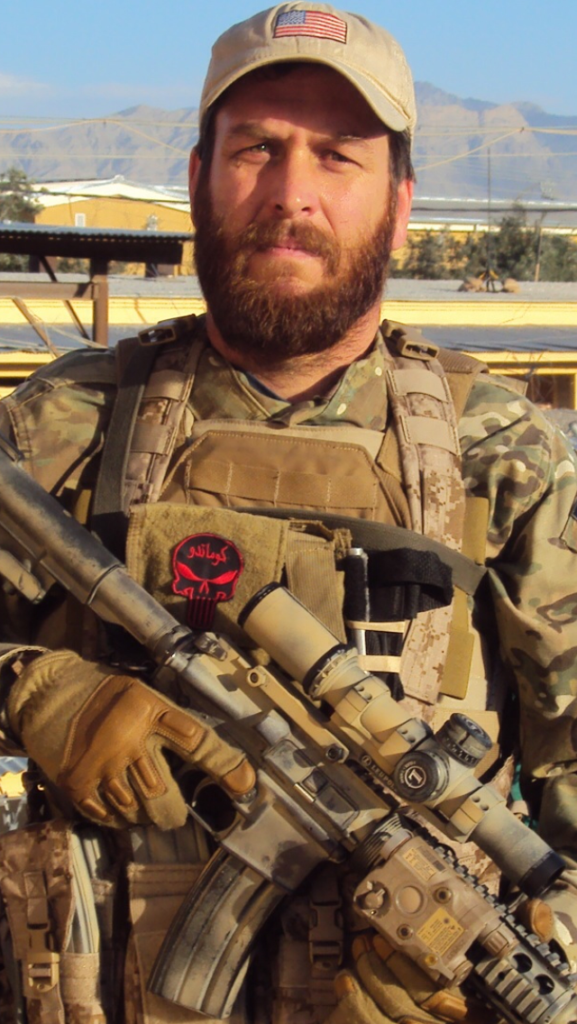
PIP: What led you to join the military, especially given that transgender people couldn’t serve?
KB: I was always intrigued by the military. I was a football player kid; I was a tough, hardcore kid. I’d get in fights. I watched all the military films and I was always way into that whole thing, and I wanted to be in the police or military or something that was service. My grandfather was out on ships in the Navy in World War II, and he told stories. My uncle was in the Army in World War II in the Battle of the Bulge. You hear enough of those stories growing up, and they are your heroes.
When I was in high school in the early ‘80s, I used to hang out at the Vietnam veterans center. Vietnam was only over for five years, so I’m in high school and I’m hanging out with these veterans and they’re all wild and drinking and telling stories. They’re kind of hippies, but they’re hardcore hippies.
The ‘80s were weird, because you still had some of the hippie attitude, but it was hippies who were listening to Black Sabbath. They had longer hair, smoking their joints, but they’d beat the shit out of someone if they crossed them. So they weren’t peacenik hippies; they were hardcore hippies. That was the vibe I got from those Vietnam vets, and I thought it was cool. It was like Jack Kerouac, searching for something, but at the same time you want to be around them because they’re cool. That was my whole growing up. In high school, the only school I applied to was military school. I got in, so for college I went to the Virginia Military Institute.
PIP: Do you feel like your identity as a trans person played into any of that decision?
KB: I don’t know. It was almost like I wanted to be military more than I wanted to be trans, but this was all before I even knew what trans was or who I was.
PIP: Do you think any part of your desire to join the military was to prove your masculinity?
KB: I didn’t really have to prove my masculinity, because I was number one in obstacle courses, and I was the best shooter — I was the best at everything I did. I was “Caveman.” I was the president of a major motorcycle club chapter. I’d stand on the seat of my motorcycle going 80 mph between cars. Everyone would look at me and they all wanted to be like Caveman.
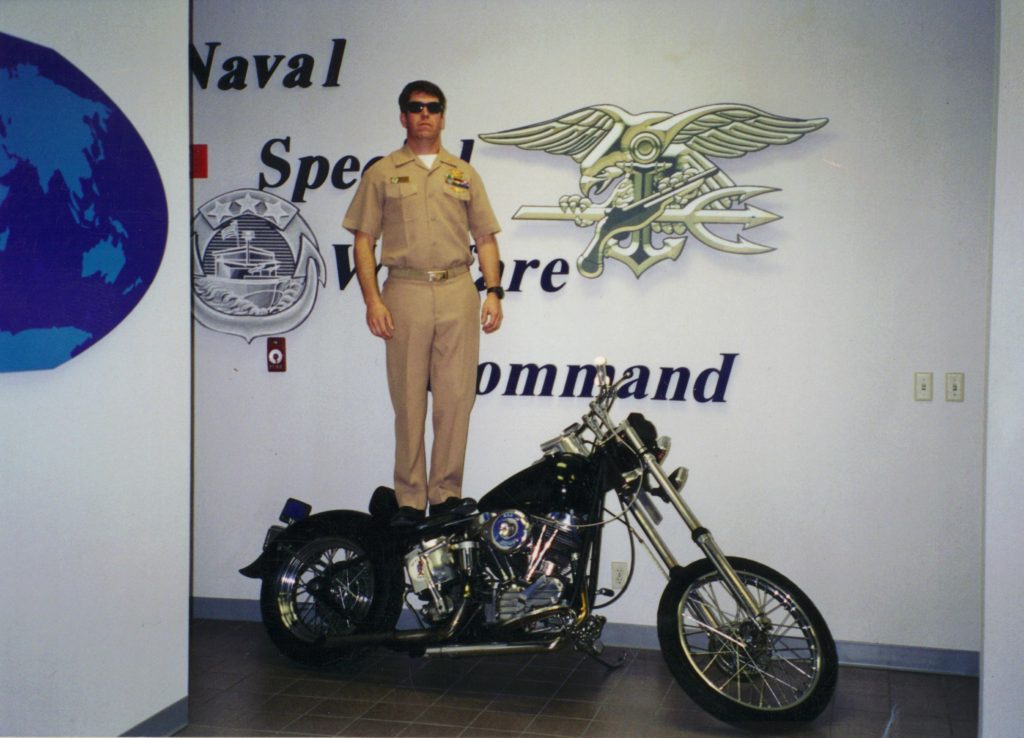
PIP: When you were serving in the Navy, was it difficult keeping to yourself that you felt that you were transgender? Or were you so busy serving that you were able to not really think about it?
KB: A little bit of both. I’d have stuff hidden here and there in my own private spaces, in my apartment or on my sailboat, so I’d do it once in a while. But when I was actually working — you deploy for six months, and you’re not going to do anything. You might think about it, but you’d never get dressed up [as a female].
Everyone in SEALS is a “Caveman.” It’s all the top performers and pretty hardcore and super professional; there’s no time to goof around. Especially when the war broke out in 2001, and then it was just turning and burning. I was deployed a lot and I was happy with that. When I came home, I’d be around there for three or four days just goofing off. I’d take some vacations away from everything and decompress a little bit. I had my times away when I could kind of sneak off and try to be myself, my real self.
It’s always there; it’s always part of your life, it’s part of your identity. But for me, the military and my service was the bigger part of my identity — it was a need to serve. That totally outweighed everything else.
It’s because it’s the SEALS, too. I mean, it takes you a year to become a SEAL. You’re doing six months of basic SEAL training called BUD/S, then six months of hardcore advanced training, and everything is a test and everything is evaluated. Finally after that, you become a SEAL, so who in the heck is going to take a chance to throw all that away?
I ended up going to one of the top teams and being requested by name in a lot of places to work some very technical, intense missions because I was really good at my job, and that all helped. I would never give that up for my own identity or for my own personal comfort. I think everyone in the military gives up some of their identity. You give up a ton of rights, you give up identity, you basically give up your life, you know? Your family suffers, you suffer, everything is suffering in the military. So for me to give up a little bit more of my identity, a little bit more than everyone else had to, it was not a big deal.
PIP: How soon after retiring from the Navy did you come out?
KB: I retired in 2011, and I worked at the Department Of Defense — the Pentagon requested me after I retired to do a bunch of special projects. I turned around a day later and was working in a suit and tie in the Pentagon. My salary was over $150,000 a year doing special projects, and it was like I was coasting. I was like, “Wait: I’m not in uniform anymore, but I’m still having to give up on my identity, and it doesn’t make any sense anymore.”
In 2012, I started going out a lot more as myself. I started going out every night. I was retired, and I wanted to live my life. So in February of 2013, I went from suit and tie walking into the Pentagon, to the next day wearing a dress and heels walking into the Pentagon. I just said, “To heck with it, I’m going to be myself, and I’ve earned it, and this is my life. I’m not going to give up my identity, I’m not going to give anything else up. I’m going to try to be happy for myself.”
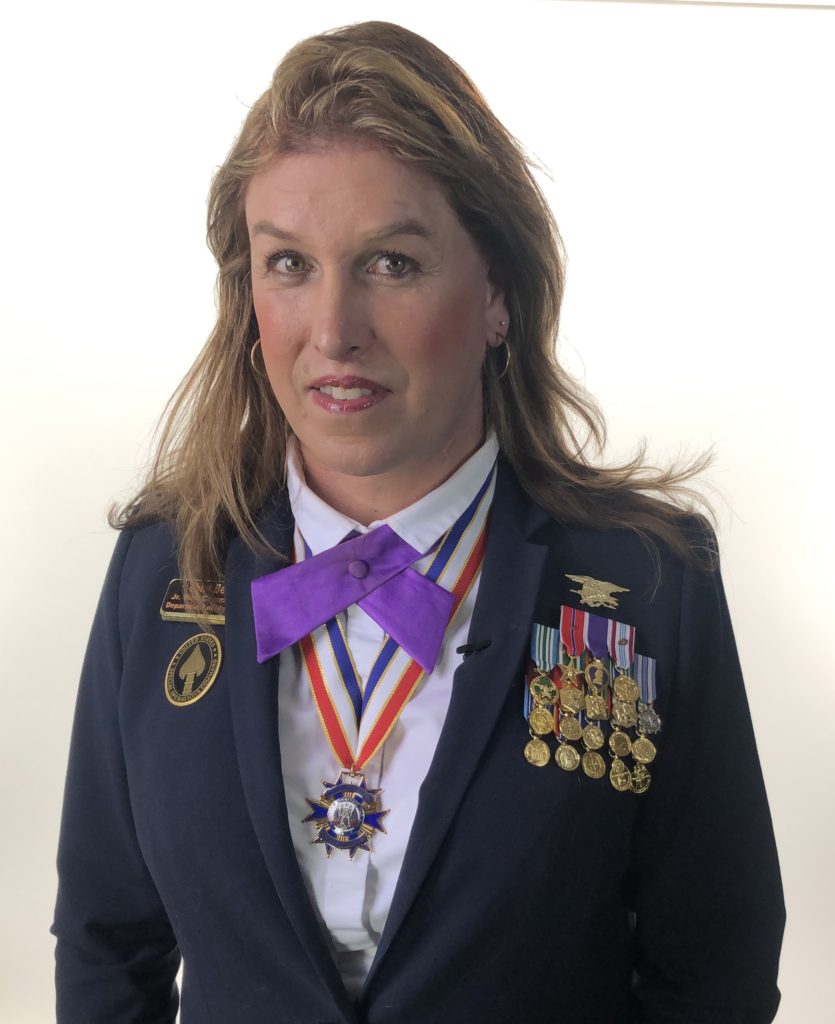
When that happened, it caused a huge ripple. My direct boss was an Assistant Secretary of Defense, and his boss was Ashton Carter. At the time, Ashton Carter wasn’t yet Secretary of Defense — this was 2013. I came out right under his watch. He saw everything. He saw me the first day walking down the hall with his group, so he hears everything going on, he sees everything happening. Then finally, I don’t have a job anymore. I’m gone.
PIP: What happened?
KB: They couldn’t discriminate against me, but they weren’t including me in meetings and I was missing stuff, and they were making it really hard for me to do a good job. I just felt like a turd taking this big salary and not doing the job. I can’t do my job if you’re not going to invite me to the meetings. I can’t do the job if I’m left off the list, or If I don’t get all the emails and I don’t get all the information. I can’t do the work.
Finally I said, “Hey, you guys want me gone, I’m not doing the job you hired me for, I can’t do this.” So I left. It was one of those things where they couldn’t fire me, but they definitely wanted to — they wanted me gone. It was super uncomfortable. I know how it feels when a person is ostracized or isolated in a workplace like that.
It’s not directly to your face hostile, but it’s a guerilla warfare hostility, and I think that’s even worse. Because then to your face they’re all happy and smiley and shaking your hand, but then you’re missing stuff and you’re getting bad marks and getting in trouble. I was like, “Wait — I didn’t know there was a meeting!” and they said, “Well, you knew this meeting is going on.” But no, nobody told me!
That underground hostility is just the worst, because you can’t prove it, and you can’t put your finger on it. It makes it a very miserable place to work, and I think that happens to a lot of people. It happens in the LGBT community, it happens to women, to African Americans, to a lot of minorities, that underground hostility. It’s not a hostile workplace on the surface, but it sure is a difficult work environment. And how do you keep your sanity doing that?
Discrimination doesn’t have to be a punch in the face or someone getting fired. It can be not getting invited to meeting or making you jump through a lot of hoops that nobody else has to jump through, and just making life exceedingly difficult. When you’re a person who faces that time and time again, it really wears on you. It’s really tiring. They push you out; they can’t overtly fire you, but they can definitely make the job really really difficult.
PIP: How did your friends in the SEALS handle it when you came out?
KB: In the beginning it was real rough because none of them had ever seen it before. Some said, “You skipped over gay and went straight to trans!” They said, “We needed someone to kind of warm us up to this, we need a gay SEAL before we have a trans SEAL.”
It was like, “Conan just became Barbie? That doesn’t happen!” That’s why Anderson Cooper and CNN and everybody was going crazy. It was so big because it was so drastic. Especially SEAL Team Six; Bin Laden was just killed and it was in the news. It was a super secret team and suddenly it’s not secret anymore, and they’re saying, “Well now there’s a transgender SEAL Team Six member,” and everyone is freaking out.
I personally don’t like the media and I stay away from it, but I was getting tons of phone calls for a few days. Anderson Cooper’s producer called and I told them no. I had all these huge names calling me and I told them, “No, I’m going to live a private life, I’m not going to do this.” After a week of me saying no to all these people, Anderson Cooper’s people called again.
They told me flat out, “Hey, seriously, just listen: you know Anderson is part of the [LGBTQ] community. He’ll do a great job, be super respectful, and it’ll be done the right way. If we don’t do this, someone else is going to do it like TMZ and it won’t be in your words and they’ll make up a whole bunch of stuff about you.”
So I said, “Okay, I’ll do this with you guys, but this is the exclusive. If any other news organization calls up, you’ll have the exclusive to this story. Just share it so all these other groups stop calling me.”
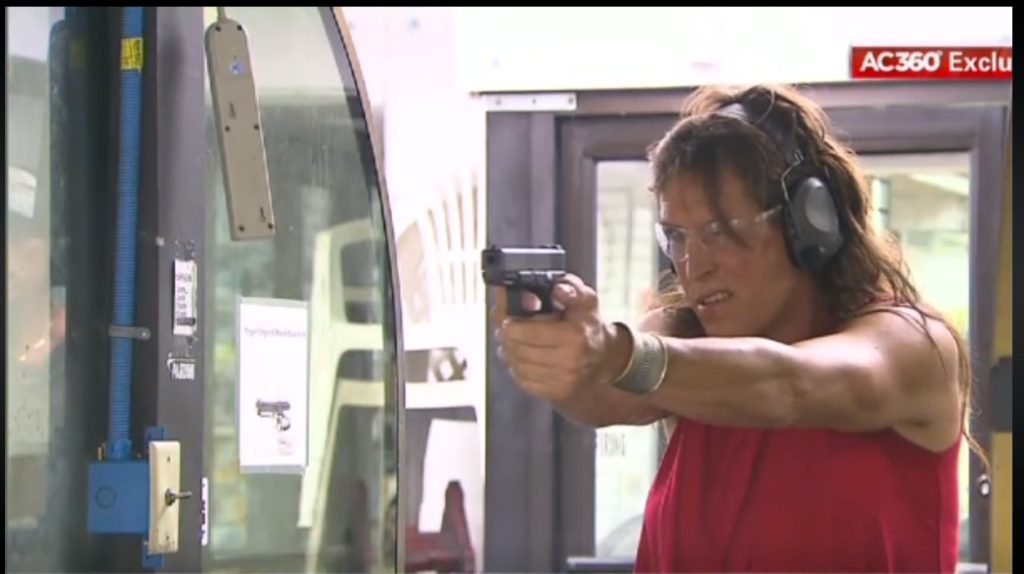
That’s why you see CNN stuff about me in a lot of other places. I said I’d do one interview and no more. From then on, after I did the CNN interview, if anyone would call me, I said, “Go to CNN and talk to them. I’m not doing anything.” That lasted for probably about six months, then other stuff was going on so I started doing more news articles, because it’s still not the whole story.
Then the CEO of CNN watched the Anderson Cooper special, and he said, “There’s still a lot more to the story — let’s do a CNN Films full documentary.” I’d already done the interview with them and it was exclusive to them, so I said, “OK, let’s do a documentary.”
They followed me around for a while and then turned it into the documentary Lady Valor. Its world debut was at SXSW in 2014. I still had my Pentagon badge at the time, and I had DVDs, so I was giving DVDs of the film to people at the Pentagon. I left them everywhere, including on the Secretary of Defense’s desk, with a note.
Then Ash Carter becomes Secretary of Defense, and everything just started changing. Ash Carter is then talking to President Obama, and then they made the big change allowing transgender service. I was still in the news, still in articles, and Lady Valor the documentary was all over the place. It was perfect timing, because I was under Ash Carter before he was Secretary of Defense, and then the movie came out. The film is 90 minutes and it’s easy to watch. The whole film is totally directed at the military and showing who we are and our capabilities. We’re SEAL Team operators, we’re at the top levels, we can do this job, and being transgender isn’t a hindrance. Sometimes it’s an asset, you know?
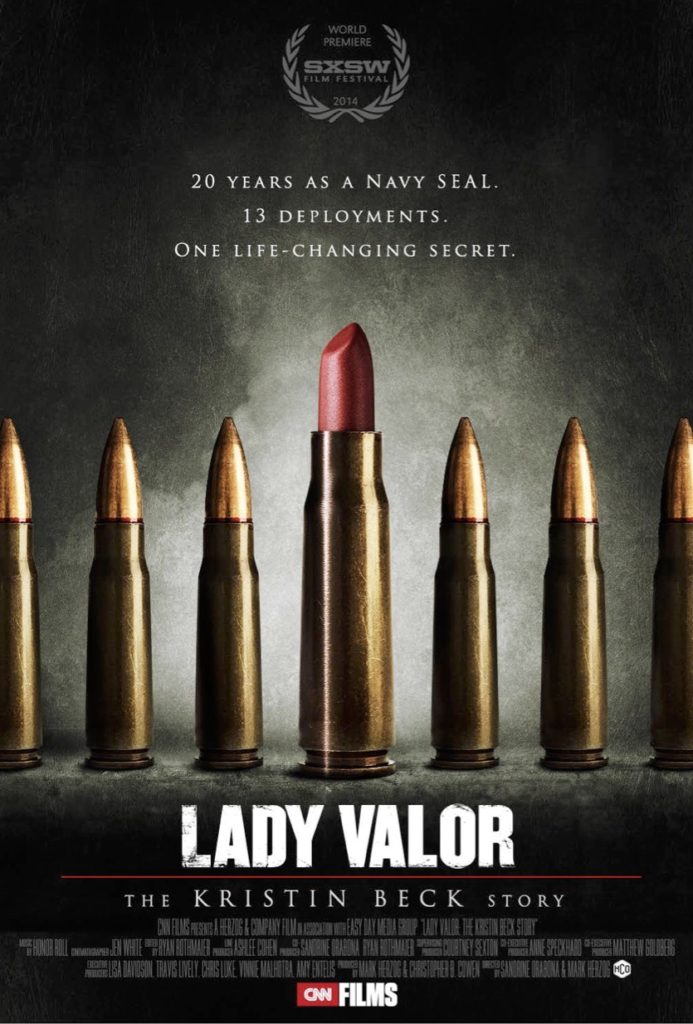
PIP: Absolutely. It was a huge deal when the ban on transgender service was lifted in 2016, and you’ve been outspoken against the Trump administration reimplimenting a ban in April. What would you say to the transgender people who want to join the military but now can’t, or the trans people who are serving and can’t come out?
KB: If you really want to join, then I’d say just hide it and join. It’ll change back soon. You have to understand that service has to be deep in your heart and that you’re going to do whatever you need to serve. I think it’s like that for a lot of people. People serve in the military and don’t do a lot of things — life’s pleasures, and everything else. You live in crappy places and you go to war.
If you really want to serve, it’s because it’s in your heart, not just because of the GI bill, or because of anything else. And if service is really that big of a deal for you, then you have to join. The ban against transgender people will change. It has to change. It’s just going to be a matter of time, so you just have to hang on.
And the good thing is there’s a lot of transgender people who made it under the deadline who are serving as transgender military soldiers and sailors right now. The thing I would warn all of these people who made it under the clause is just take your time, because you are setting the standards and writing the policy whether you like it or not. They’re on a pedestal, and everybody sees them. Whatever they do is going to be the example they’ll use to point out, “This is great, we should have trans soldiers,” or they’ll burn bridges and do dumb stuff and people will say, “That’s exactly why we can’t have them.”
PIP: Definitely. I know you ran for Congress to represent Maryland in 2015; what motivated you to do that?
KB: I ran against Steny Hoyer [in the Democratic primary] because he’s been in office for over 30 years. He was doing everything at the national level, trying so hard to be Speaker of the House. He didn’t do anything good for Maryland in years and years, and nobody runs against him.
At the time, it was right after the movie, so I still had some popularity in the media. I called a couple media outlets and said, “Hey, I’m going to run for office, would you guys be interested in doing a story?” They said, “Heck yeah.” So I felt it out a little bit. I wanted to poke the bear really hard and make him do stuff for Maryland. He actually changed some local platform points; he came around on some things, and he started paying attention to Maryland. So I lost the race, but I was successful in making him pay attention to Maryland again.
Also, being transgender — I was definitely not the first transgender person to run for office. There have been a few other folks in the past, but there has never been anyone high-profile. It got on the news, and I think it made everyone aware that we’re here, we exist. That’s another point I was trying to make — there’s nothing we can’t do. It’s dual purpose. I wanted Steny Hoyer to wake up to Maryland, and I wanted to prove that transgender people can be successful in any job. I majored in political science in college, and I’ve always been very political. Politics isn’t a far leap for me, because I’m already part of that world in a few different ways.
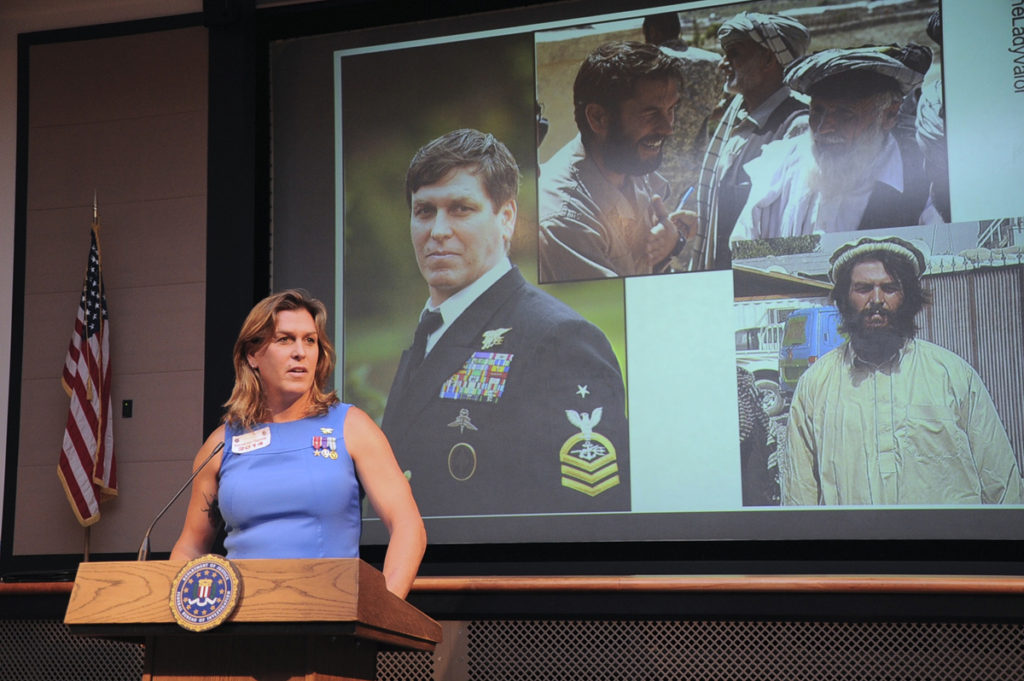
PIP: When I met you at an event last summer, you said you felt like you were Two Spirit. Do you still feel that way, or has that evolved?
KB: Well, that’s a great way to put it: evolving. I know I’m Two Spirit. Like when you were talking about the military: military service was important to me and my transgender identity was important to me, but when I had to weigh one or the other, it was definitely the military. I look at it now and I’m able to live a lot more freely, so this is where I am. But I don’t hide that part of my life.
Caveman and the Navy SEAL is still a big part of who I am, and that’s probably more the reason why I’m Two Spirit. Because I’m not going to deny my past. I don’t have a dead name or a dead person in my past, like many transgender people do. I accept my past as Caveman, as a Navy SEAL, and I accept my future as Kristin Beck, but all of this together is who I am now.
And as I go further and further, more of my past is still on the surface. It’s not making believe. I’m not trying to fit a character or trying to do everything fully female, because I’m not. I accept that, 100%. I say, “Hey, this is who I am, this is how I was born, and I’m not going to make believe or tell you it’s different. I’m still me. I’m still that Navy SEAL and I’m also Kristin Beck.”
Two Spirit is a Native American term, but it’s kind of the closest term I know of that can describe the experience. I don’t know if there’s any other term that explains it well enough. I give thanks to my Native American friends for letting me share their term for who I am.
PIP: That makes sense. What are you doing with your time now?
KB: I work on my farm and I do public speaking through a speaker’s bureau, Leading Authorities; they have a lot of general officers and really super high-level speakers, so it’s a really good speaking organization. They fly me around the world and I give speeches, and that’s pretty cool. I just flew back from Croatia a couple weeks ago, and it was awesome.
PIP: Wow! I also know that you wanted to open up a center for service members with PTSD?
KB: Yes, I did that, and I have money in an actual foundation called the Mindful Valor Foundation. Mindfulness is a catchphrase now and it’s a bummer, because it’s something I’ve been doing for a while with some of the martial arts I’ve been working on. When you go into meditation and you’re doing yoga or martial arts, you have to be in the present and be mindful of where your body and mind is. Mindfulness is a part of a lot of the training I’ve had.
Then when you think about valor, the movie Lady Valor, and the ranch is called Valor Ranch, so I’ve always had valor somewhere in the name of what I’m doing. I think it makes sense — if you have PTSD, valor is something you can identify with because it’s a military term about service and putting yourself forward. If you can be mindful about it, put those two things together: mindful valor. If I can be mindful about all the trauma and PTSD I’ve got, if I can take all that and analyze it and go through some steps and different practices, then I can look at it differently. With PTS — they took off the D, because it’s not a disorder — it’s just something you have and you can work with it and get better.
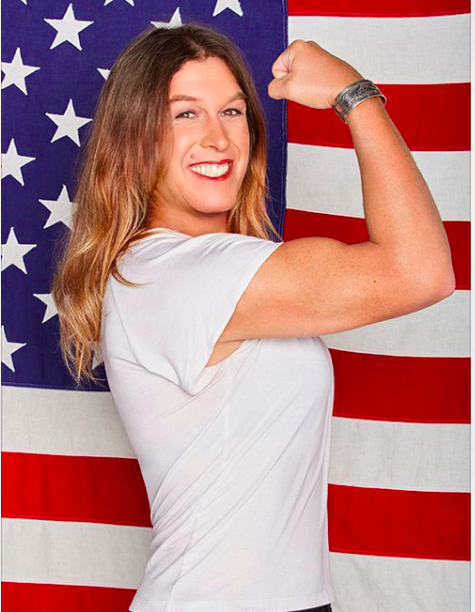
A lot of veterans have PTS and/or traumatic brain injury from all the explosions. I have PTS and TBI. That’s what I’ve been treating, and I have a whole bunch of different therapies and alternative methods, and I want to keep searching these out. Eventually when I have a big enough menu, we can work with the VA. I’m actually briefing them soon. We’ll try to implement some of these things, and if I can, I’ll use the money from the foundation to bring people into the program.
I don’t want to take pills and cure the symptoms of your PTS. I don’t want to give you a pill to make you groggy and lose your mind into a haze of unconsciousness. I want you to look at the whole thing. We’ll be mindful of what that trauma was, learn how to cope, and give you a bunch of tools and ways to work with it.
All this trauma never goes away really. It’s just like me having my Caveman as a past. I’m never going to get rid of Caveman. For me to deny Caveman, I’m denying 40 years of my life, and that leaves a hole, and what fills that hole up? I don’t want to fill that hole up with a bunch of Cheetos or booze, because that’s the PTS. If you take a bunch of pills and you’re groggy and hazy, you’ll fill it up with Cheetos and it doesn’t work that well. And that’s when you start having problems. Don’t deny it, work through it. Maybe we can dull it out, maybe we can push it further in the past. It won’t go away, but we can make it more controllable and when it comes up I want you to recognize and deal with it.
When I recognize it’s coming — for me it’s like an anger or a depression or anxiety — I’ll recognize it sooner so I can do another practice and take a tool out. I see anxiety and I have this tool in my toolbox and I can see it and I can work on it instead of having it crash upon me and make me feel stuck or falling into the pit or darkness.
We have a 501(c)(3) for the foundation, so everything’s all done with it, it’s 100% up. I have donations in there; I’m already raising a lot of money. It’s rolling, and it’s something that’s going to be successful, because I have a lot of people that are really fired up about it. I have some really good people who are helping me, because they believe in me. I’ve been to the VA headquarters and talking to people and they like it.
PIP: That’s incredible. So you were recently part of the Converse Pride campaign and were in their ads wearing their trans pride shoes. How did you get involved with it?
KB: It was pretty awesome. I give speeches, and Converse invited me to Boston to the headquarters to give a speech, and there were people crying and laughing and then cheering. They gave me like two standing ovations; They really loved the talk and the message.
I guess it moved a couple people, so they invited me up to do another thing. Then they said, “Hey, you’ve been here twice, and this is really cool. We’re doing this Pride campaign and photo shoot, and we want to know if you want to be part of it.”
I said, “Heck yeah, I want to be part of the campaign!” So they brought me up to NYC and we did a huge modeling shoot, and now I’m up on billboards. It all started with them hearing that first message. The best part is proceeds from the Converse Pride campaign went to a nonprofit, Point of Pride. I gave my money to Aydian Dowling [who started Point of Pride] because he’s a really great guy.
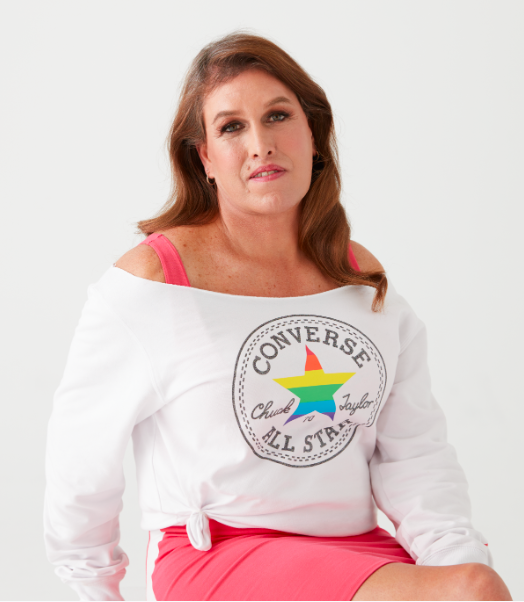
I think trans men get forgotten about, because they’re not as flamboyant as us trans women. I specifically wanted to help out trans men because they don’t always get the headlines and publicity I think they should be getting. I especially like Aydian. I want the trans men to know there are a lot of us that are thinking about them. Even though we steal a lot of the headlines, we try to give as much back as we can to everyone.
PIP: Definitely. In closing, what do you want your legacy to be?
KB: Converse sneakers named after me! Just kidding. Actually, I think my legacy will probably be this mindful project, Mindful Valor. I’m working on some real solutions to trauma and to this suicide epidemic we have right now. I think if I can work on it really well with the VA and through the military channels — it’s easy with the military folks because I’m military and VA, and I can see what the trauma looks like because I’m part of that group.
I also want to take it to junior highs and high schools and have it for guidance counselors. I might be in with a statewide group of guidance counselors, all the guidance counselors for an entire state, going over some of the procedures. Because I want them to have all these tools for the students. They’ll always be around the students, and they can say, “Hey, come in here, I want to show you something,” and they can go through some of these practices.
I’m starting with the military first to build up our toolbox as big as we can, with some of these techniques, and I want to try to spread it down to the junior high and high school level. Because I think we can help out the younger generation.
Keep up with Kristin Beck on Instagram @valor4us, on Twitter @valor4us, and on Facebook.

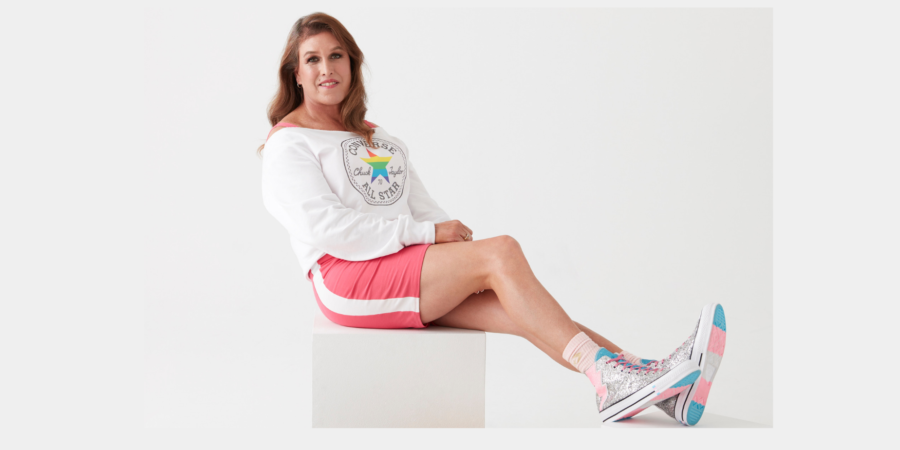
I am not gay nor trans. But I was a teacher, school nurse, and school behavior specialist for 30 years.. I have seen it all. At least I thought I had seen it all. I retired in 2006 the first time and 2012 the second time. My, how things have changed!
When I started in education, “gay”, queer, and other expressions were very demeaning and used to be hurtful whether you were or not. Trans was an unknown term in schools…a mental illness.
I saw kids that I felt like were struggling with something . Little hints and clues.
There is a real need to educate schools and our society in general. A tough row to hoe. To talk about gender issues and/ or being gay is to buck our culture, religious beliefs, and hardest of all our own selves.
I said all that to say that people like Kristin can be a guiding light, a beacon of hope, an example to follow for those seeking…whatever they may need.